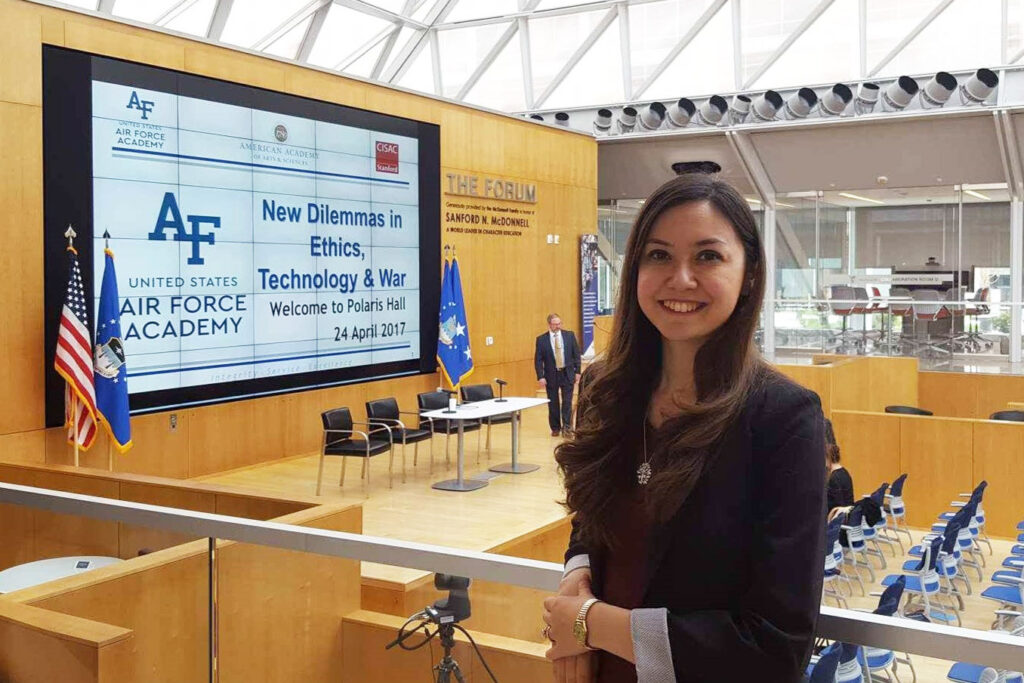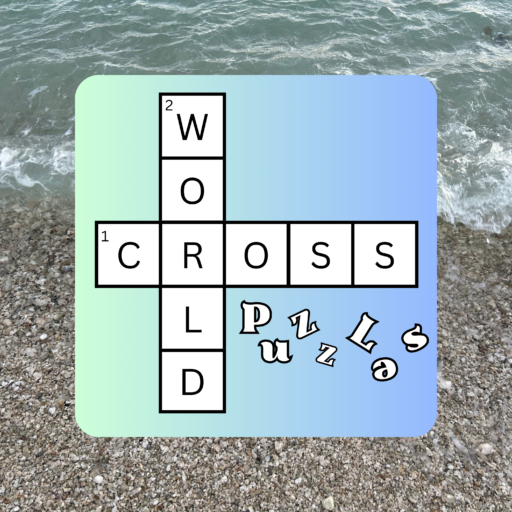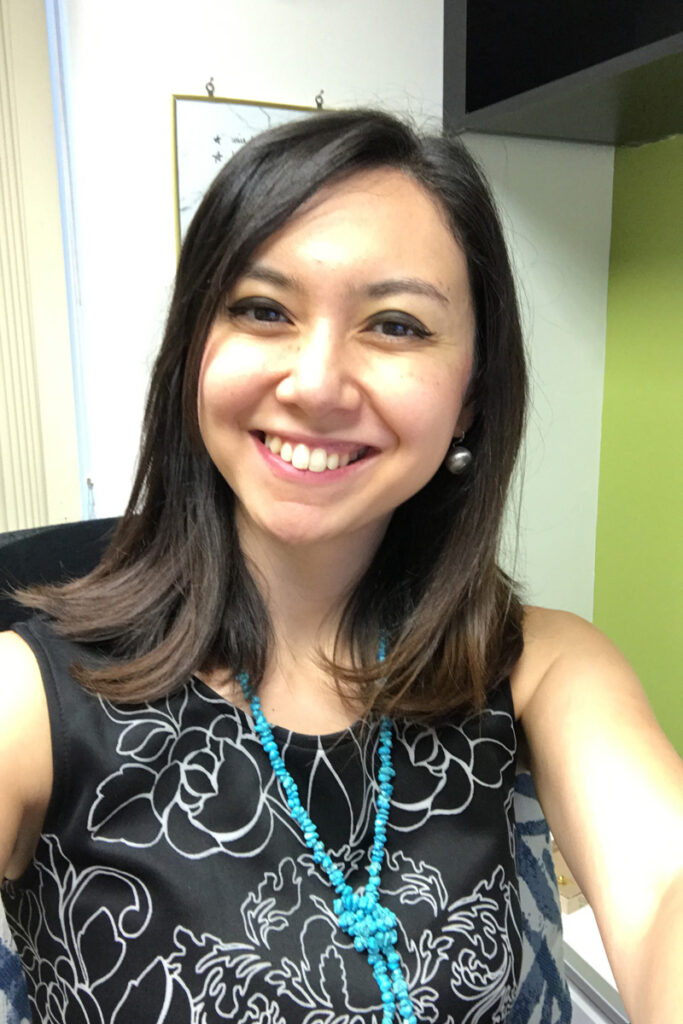
Sayuri Romei is half Japanese and half Italian. She was raised in Rome, Italy, where she attended French school, as well as Japanese school on Saturdays. Based in Washington, DC, Sayuri is the Senior Fellow for Japan at the German Marshall Fund’s Indo-Pacific Program, where she leads work on Japan and US-Japan-Europe relations. She’s also an illustrator and has illustrated several books in the United States, Japan, France, and the United Kingdom. Sayuri holds bachelor’s degrees in English language and literature from the University of Sorbonne, and in international relations from the University of Roma La Sapienza, and a master’s degree in international relations and a PhD in political science from Roma Tre University. She enjoys spending time with her family, cooking and eating good food, reading, and practicing sports. Over the years, she has practiced ballet, figure skating, yoga, badminton, singing, playing the piano and the guitar. Sayuri also has a keen interest in languages, and started studying German and Russian in middle school and continued throughout her first bachelor’s degree. She is currently studying Korean privately.
(Click on these social icons to follow Sayuri: ![]()
![]()
![]() )
)
Podcast
Transcript
Introduction
This is Ms. Sayuri Romei, who’s based in Washington, DC. And I thought she would be a wonderful guest for this podcast, which is all about interviewing multicultural people, and how they overcame any hardships and how they found answers to really big life questions.
So again, thank you for being part of this.
Thank you so much, Shiori-san. Good morning. Thank you so much for inviting me to your podcast today. I think it’s a great initiative and I’m really looking forward to our chat. I feel very honored.
Background and Upbringing
Thank you. Could we start by asking you, where were you born and raised, and what was your identity growing up?
Sure. I was born in the south of Italy, in a region called Calabria, which is the toe of the boot near Sicily. My dad is from there. But I was raised in Rome. My mom is Japanese. I was raised in a multicultural environment, and they sent me to French school.
So to your question, “what was your identity growing up?”–to be completely honest, I never really asked myself that question. So I kind of struggle answering that right now. I learned to speak multiple languages when I was little. So I grew up speaking them naturally.
I’m going to say though, in Italy, most people assumed that I was Asian. And in Japan, most people assumed that I was a foreigner. So I think that part could be a little frustrating to explain sometimes or to be viewed as an Italian or Japanese, but I think I just considered myself both Italian and Japanese.
When I lived in Paris, for my first bachelor’s degree, I remember considering France my new home. And now that I’ve been living in the US for about eight years, I feel like it’s become my home too. I guess you can just say I adapt pretty easily to new realities. So I’m not sure, but to respond concisely, I’ve always considered myself both Italian and Japanese.
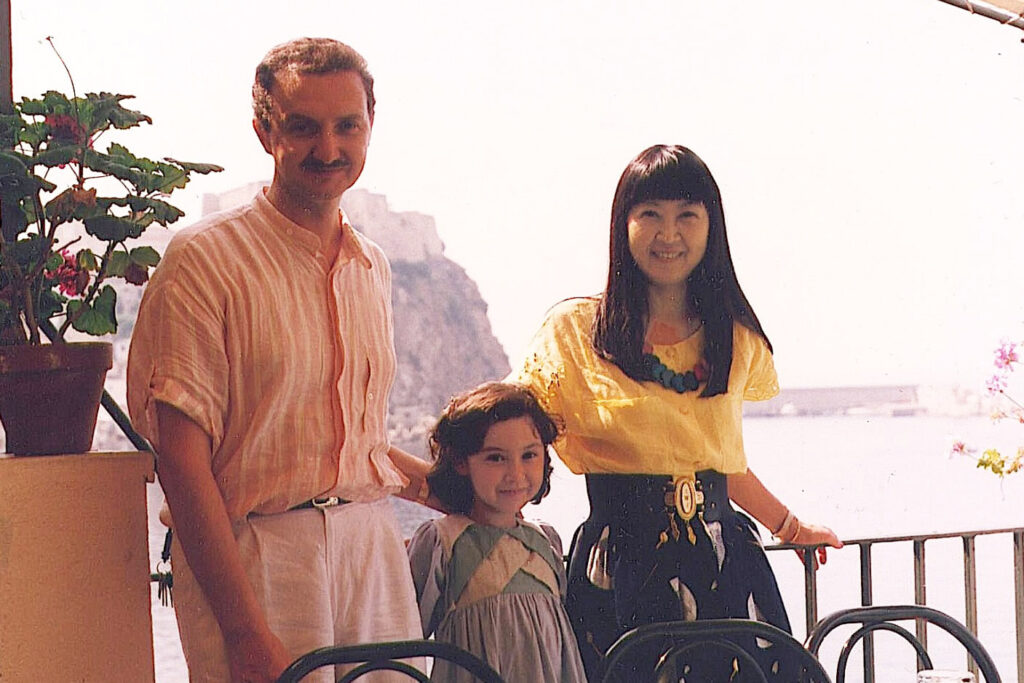
Making Friends
That’s really wonderful. Because from my experience, it’s really hard to feel positive about being both. When I’m feeling good about myself, I feel like I’m both American and Japanese. But when you’re in one country and you’re always seen as an outsider, sometimes it can feel lonely too. Did you ever feel that way, or were you always surrounded by supportive friends and family and you didn’t have to feel that lonely?
I don’t think I’ve ever felt lonely. It was just annoying sometimes to have to explain why you look different to other kids. But kids can be very cruel, but they can also be very malleable in the sense that they receive that kind of explanation and they’re like, “I see. Okay.” And then they want to hang out with you.
But in the nineties, as I was growing up, even in Rome, which is a capital city, it was pretty provincial, and kids were all ethnically Italian. Italy now is much more multicultural. There are a lot of Asian kids, especially from China, and there are lots of African kids. And I think schools are much more multicultural. So I think that would be a different experience for a child now.
And I used to spend most of my summers in rural Japan, at my grandma’s home in Toyama. I was going to school there, and the kids had never seen a foreigner before, and they were very curious to talk to me. I did get some weird questions. And they were very interested in getting to know my dad as well, who was the foreigner, the Italian. So at times it can be a little annoying and having to always explain and answer the same questions. But I feel really lucky that I never had a lonely or bad experience.
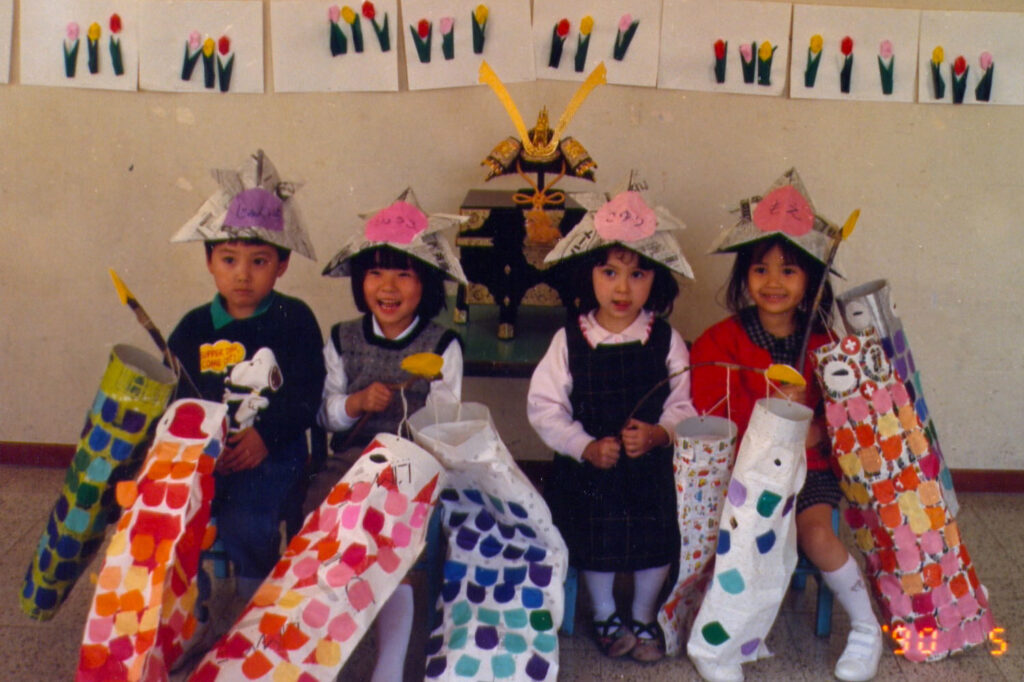
Moving to the U.S.
That’s wonderful. I think it really speaks to your personality. You seem like such a positive person, and it sounds like you were able to make friends wherever you went. You mentioned that at one point you considered being based in France, but now you’re here in Washington, DC. Would you mind explaining how that transition was and how you ended up being in the U.S.?
Sure. So, as I mentioned, I grew up in Rome. But I first went to Japanese kindergarten. So my first language was Japanese. And then they transitioned me into French kindergarten, and then, full time French school. So all my studies were in the French system.
It’s a unique situation where I’m Italian, but I lived in this French bubble for school in Rome. So I never felt completely Roman either. But of course, I was studying in French, but I never felt completely French either. And then in the summer, they, my parents always took me to Japan to spend the whole summer there. So it’s a little bit of an adjustment, but as a kid, you just adjust pretty easily. So I grew up between these three countries.
And then after, graduating from French high school, it was just natural for me to go to Paris, to continue my studies. And I actually studied English language and literature, at first, that was my first bachelor’s degree at Sorbonne.
I started studying English when I was in middle school around the time I was 13, and it was my first love. I loved learning English, speaking in English, learning pop songs in English, and reading novels in English. That was just really fun for me. And it came really easily. That’s why I just decided to pursue my passion. I started studying English language, literature, and culture at the Sorbonne University in Paris. I did that for three years until graduation.
After that, I went back to Rome, Italy, to focus on something else because I wanted to add something. I felt like languages are a great tool for cross-cultural communication. But I wanted something else as well. And it was the early 2000s; there were lots of political events around the world. So that’s when I started studying international relations. And it was going to be not just politics, but international relations because I had a multicultural background. I did the rest of my studies in Rome. My second bachelor’s degree in political science, my master’s degree. And then during my PhD–yes, I’ve been in school for a long time…
You’re amazing.
I’m done now, hopefully!
No second PhD?
No thanks! But yeah, during my PhD, I had the opportunity to apply for predoctoral fellowships. And that’s how I landed a fellowship at Stanford in California. I wanted to come to the U.S. because my boyfriend at the time was American. I just wanted to be closer to him, but also at the same time, I had a good excuse because my topic was U.S.-Japan relations. I thought it was a good way to study that topic from the U.S. point of view. So that’s how I landed in California for a year. And after that, I moved to Washington, DC to join my now-husband. And I’ve been in DC for seven years.
And do you think you’ll stay here for a bit? Do you like Washington?
I do; I really like Washington. When I came here seven years ago, I was really amazed by how international this town is. And it’s not as big as other cities like New York or Rome or Tokyo. It’s really small and sometimes it doesn’t feel like a city. But I just love the fact that everyone is very driven and super ambitious. And I met a lot of very interesting people here, who are very capable and competent, who have so many good qualities and interesting backgrounds, and who speak multiple languages. It also helps that DC is the only city that doesn’t give me seasonal allergies!
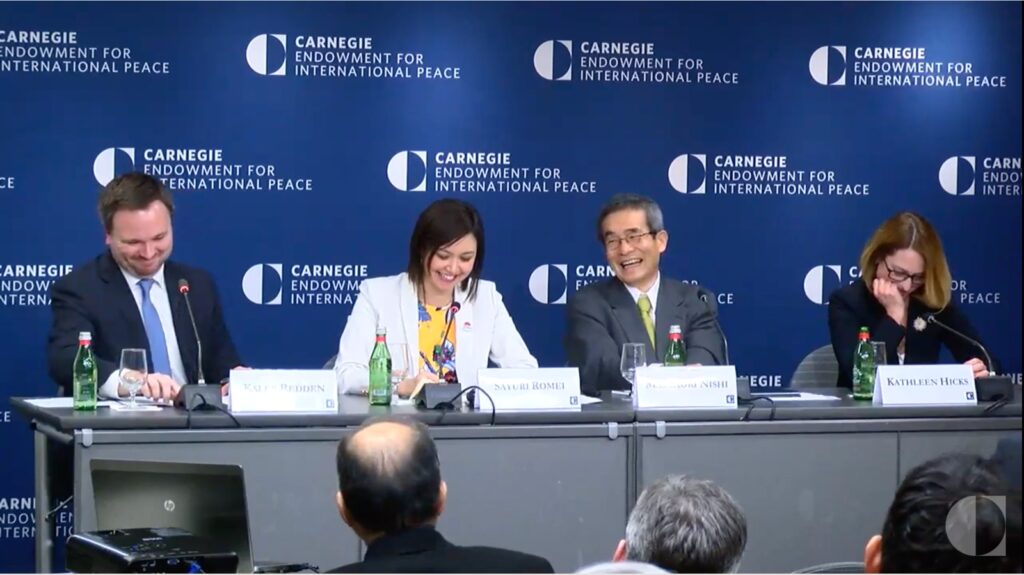
Balancing Art and International Relations
You’re really adaptable. No matter which environment you’re in, you’re able to make yourself at home. And I think that really speaks to your personality.
I wanted to change gears a little bit, because you mentioned how you studied literature first, and then went into international politics. But what I’m also curious about is, you’re an amazing illustrator and you published this book with your mom when you were younger. And so you have this really artistic side, but you’re able to be a panelist and a columnist about nuclear policy or something really difficult like that. How do you keep the balance between those two: your artistic side as well as hard subjects?
That’s a good question. I don’t really have a good answer. My full-time job now, my day job, is being a Senior Fellow for Japan at GMF, the German Marshall Fund. So I’m working on these hard security issues, and my background is in nuclear deterrence, in U.S.-Japan relations. It’s very different from the artistic world that I’m also drawn to. I wish I had more time to draw, but I’m continuing to keep that up. I don’t know how to keep the balance, to be honest. I feel like being an illustrator has helped me in releasing some tension and feeling less stressed out in moments where I had a lot of work or had to study a lot throughout my life. It was a really good outlet and that really started to become a second job. I’m just lucky enough to have kept those two sort of careers. The illustrator one is not a day job, but I do want to keep it. In fact, this week, this month, I have another commission for a Japanese woman who lives in Arlington [Virginia].
That is really cool. Wow.
Yeah. So I think it’s a way to keep me sane and motivated and connected to my roots and the things that I love doing. I can’t imagine going through my life without art in general. Art is a very major part of my life and it’s always been that way. I’ve always drawn since I was a toddler. I never stopped really. I never considered leaving academia or the thinktank world or my day job in general to just focus on art. I don’t think I’ll do that anytime soon–maybe when I’m retired–but it’s something I want to keep in my life.
Why have you decided to pursue these harder subjects in terms of your career as opposed to art and literature?
I don’t know why, to be honest. The security issues really interest me and they are another way of using my brain and using my language skills. And it’s another way of connecting with, in my case, Japan. And now, in this new job that I started this past week, I am focusing on U.S.-Japan-Europe trilateral relations, which is perfect because it really allows me to connect with all three of my identities. So I’m just very passionate about this work and I cannot imagine leaving it.
And the illustration part is just as fun, but it’s a different way to use your brain. And I am just not confident that I would be able to make a career out of it. At least not right now. There are so many talented people out there, and I don’t think I would have the patience to pursue that kind of artistic vocation right now.
Building a Family
Going back a little bit, you grew up with Italian and Japanese identities, yet you decided to marry someone who’s American, which is a third, yet another culture–on top of the French language and culture that you also grew up with. So how do you continue to learn about these different cultures and get used to it? Because when I think about having my own family, language is really key for me and I think it’s important to be able to speak what you’re truly feeling. And being able to speak an acquired language so comfortably that you’re able to have a family in that language is so amazing to me. Could you tell me about how you met him and ended up marrying him?
Operating in a second, third, fourth language is definitely difficult. It’s very tiring and it’s not easy on a daily basis. But this was my choice and I have to deal with it!
Jokes aside, I met my husband in Italy, near Rome. It was at a conference that he was running on nuclear policy issues, and I was a participant there. This was 10 years ago now.
He’s American, but he grew up in the UK. He studied German at school. So he speaks German as well. He’s very international. He has traveled everywhere since he was a child. So it was easy to connect with him in that sense. He is very open-minded and flexible. So the dating part hasn’t been difficult at all. We got married almost eight years ago now, but it hasn’t been difficult.
There were some minor cultural differences. For example, it took us a long time to figure out that we were not on the same page when talking about movies, because Italy tends to translate movie titles to something very different. And when I was talking about movies with my husband, he kept saying, “Don’t you know this movie? This is super famous.” And I was like, “No, never heard of it.” Then he starts telling me the plot and I’m like, “Of course, that’s The Red Tiger!”
What is The Red Tiger, by the way? Are you just making it up?
Just making it up! So at first, we had that kind of a minor cultural clash.
But I feel like I can express myself well in English; I feel very comfortable operating in English now. But when I’m tired, I do notice that I blurt out things in Japanese or in Italian. Like when I hurt myself, these natural, instinctive reactions come out in Japanese or in Italian sometimes.
For example, I often talk in my sleep and my husband tells me it’s either in Japanese or in Italian or in French, but never in English. It’s very funny. I don’t remember it, but I do catch myself saying stuff in Italian or in French or in Japanese in the morning. So the brain’s really fascinating. But at this point I speak English every single day with my husband or at work. So I’m now very comfortable operating in English.
But when we have our son, who will be born soon, we are very aware that he will have to learn even more languages than I did as a kid.
Wow!
He will be raised here in the U.S., but we really plan on him to be able to speak Japanese and Italian as well; at least those two. So we’re gonna have to figure out ways that that can be possible.
In terms of the cultural differences between me and my husband, of course they’re there, but there’s nothing that’s impossible to overcome. So far so good, but when a child comes in the picture, it’s going to be a challenge. But we’ll just try our best.
Languages and Code-Switching
Thank you so much for sharing all of that. I’m just amazed at how adaptable you are. And I think you have a real talent for languages. You’re quadrilingual, maybe more, and to be able to do amazing professional work in all these multiple languages is so wonderful. And you’re just so humble about it too, and always positive, and I’m always so inspired by you.
Well, that’s very nice of you. Languages are really difficult to keep up. When you are a child, you just learn them naturally. But keeping them up as an adult, any language, is extremely hard. I mentioned that I speak English at work and at home now. Thankfully, I do keep up my Japanese because I deal with Japan a lot and I’m with Japanese people all the time. I go to Japan at least twice a year. I have family there and of course I speak Japanese with my mom. So that’s good. And I write emails daily in Japanese. I just try to keep up with newspapers and novels in Japanese, and I try to force myself to pick up a pen and write in Japanese. Otherwise, I feel like the kanji, the characters are super easy to forget. You can type them, that’s easy, but writing them, it’s just something that stays with you because you’ve learned it as a kid, but also at the same time, it’s very easy to forget.
And Italian, which I grew up speaking, I only speak it with my dad now and with a few friends, but I feel like that’s not really enough. Even when I speak on the phone with my dad, I catch myself forgetting some phrases or expressions. That can be a sad moment. And it’s just very frustrating. It’s something that never happened to me before, but has in the past few years.
Languages are very advantageous. It’s nice to have them. I feel really lucky and grateful that my parents raised me speaking these languages, but as an adult, you definitely need to keep them up.
Absolutely. Do you conduct yourself differently in the four languages that we talked about, French, Italian, Japanese and English? Do you find yourself code-switching, and what’s the difference?
Yeah, definitely. My voice changes. My mannerisms change. My expressions change also. I feel like in English, my voice is lower and the tone of my voice is lower. In Italian, I use my hands a lot more. And my expressions are very different because you speak each language with a different part of your throat, your bones, your muscles in the mouth. Every language has its own way to speak, so you use different muscles. And that’s how you end up with three different personalities. And it’s not something that I necessarily notice. But my husband, my parents, or my friends do see that change.
And because of the way the Japanese language is structured, the kind of relationships you have with someone who is Japanese is very different with the kind of interaction you would have in English. The whole honorific and whatnot, that definitely impacts the way not just the actual words, but also the way you behave. In Japanese, I nod and bow a lot. And my husband noticed that when I speak in Japanese and I laugh, I put my hand over my mouth–which I do not do in English and in Italian, and is so strange if you think about it. But yeah, there are definitely changes in my body language.
Interpreting for Family Members
So far it sounds like you’ve always had a way to find answers within yourself or by interacting with others. Did you ever struggle with going between all these different cultures?
There weren’t any major challenges. This is not a real challenge because I do it happily, but being the only one who speaks many languages, I often have to be the interpreter. When you marry an American who doesn’t speak Italian or Japanese, and you have parents who don’t speak English, Christmas and Thanksgiving can become really exhausting. At the end of those holidays, I usually lose my voice.
Oh my goodness; I’m so sorry.
Well, I do it happily, because it’s family and I love all these people. But yeah, I do have to translate everything constantly for everyone in my family, including jokes, which can be tricky and awkward when they’re translated, especially with the delayed reactions. But our family has gotten used to it. My mother-in-law is studying Italian, and my mother is studying English, so that’s a big help.
But in general, challenges growing up, I don’t think I can honestly talk about anything significant. As I mentioned earlier, it can be annoying sometimes to have to explain why you look different and things like that. But other than that, I’ve been really lucky to have people who have been nice to me, friendly and supportive. So I can’t think of anything really.
Curious About Others
That’s wonderful. Would you say that you’ve always been comfortable with who you are, then? You’ve never had to struggle to fit in into whatever community you were in at that moment?
I think so. I don’t know why, but I’ve always been very comfortable. I think it helps that I’m an extrovert and I love talking to people. Since I was a toddler, I just loved the playground, and would just go to some kids and talk to them in whatever language. I made a few kids cry because I was too forward!
No way! You’re so nice.
No, seriously, I’ve always loved interacting with people, and I think that’s a really important part of my life. I am interested in other people; in other people’s stories. I guess I’ve always been flexible and adaptable and comfortable with who I am. I’m fully aware that I was lucky to be raised in a multicultural environment and I just see it as a huge plus.
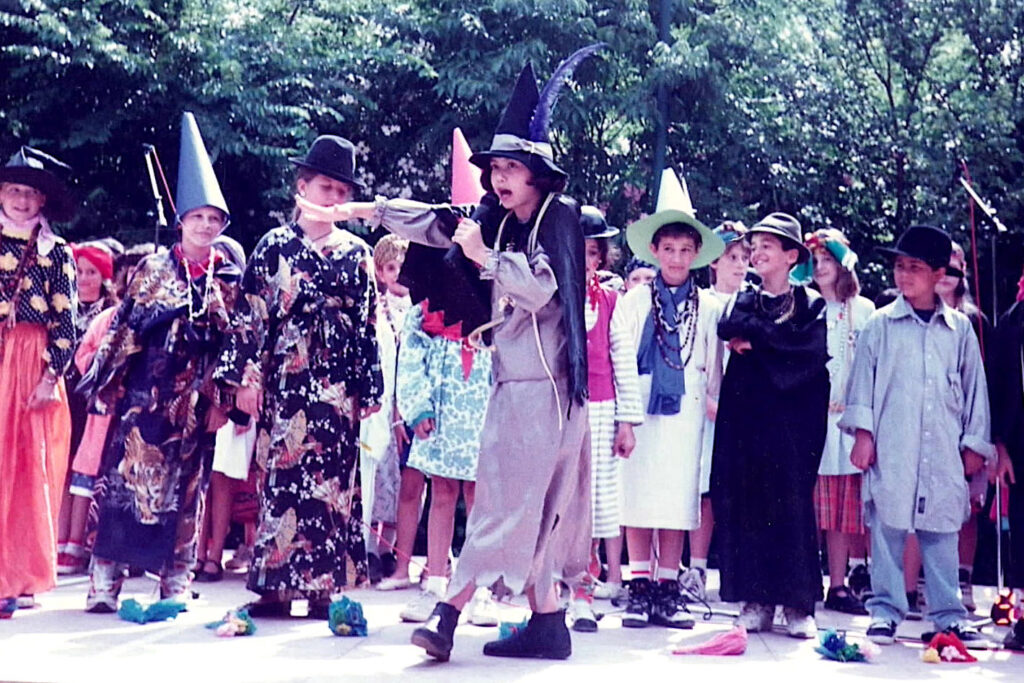
Identity Can Change
That’s great. Would you have any advice for people who are also growing up in a multicultural environment? You said that it’s really your outgoing personality that has helped, but would you recommend that others try to be more friendly? What would you say to them?
Well, of course everyone has their own personality and it’s hard to change. If you’re an introvert, if you’re not that outgoing, that’s fine. That’s just your personality. It’s okay to be an introvert as well, of course. And to be happy on your own, that’s totally fine. I’m happy on my own as well.
I think what I can say is being multicultural is always a plus. It’s never a minus. And having multiple cultural identities definitely does not feel the same for everyone. And it doesn’t look the same for each of us. But you can make your own unique experience from that.
And there will also be different times throughout your life where you will feel more, for example, Japanese than American, right? Or vice versa. And that’s totally okay. That’s just part of who we are. So it doesn’t have to be an identity that’s set in time, either. I think the key point is really that having different identities, being multicultural is always a plus.
Thank you so much. I personally really needed to hear that. I’m definitely an introvert and I think that’s one of the reasons I may have struggled with it in my childhood, like making friends and feeling like an outsider no matter where I was. So I’m really inspired by your experience, and I’ve learned a lot because I assumed that everyone had a bit of a painful experience. It’s always positive, but there’s always some struggle, not just in terms of language, but I think socially in the classroom and such. It’s really refreshing to hear that that’s not always the case.
And it was really helpful for me to hear that you said that you might feel a certain way in one stage of your life, but that’s not permanent. It feels like a really positive thing that we can continue to change if we work hard at it. So thank you so much.
Yeah, and that’s a good thing to not feel like setting an identity forever, you know? It’s a good thing to be able to change how you feel. And that’s part of being multicultural. I feel like multicultural people are also very diverse and we all have such different experiences. It’s really interesting and that’s why this podcast is so important. I’m very, very curious. I’m always seeking out people who are like me, multicultural or like half something or double. I’m always very fascinated by them and I just want to find out more about their experiences. So thank you so much for doing this. This is really important.
Thank you so much for being part of this. I’m sure it was a risk, but I really feel honored that you trusted me to do this. So thank you so very much.
